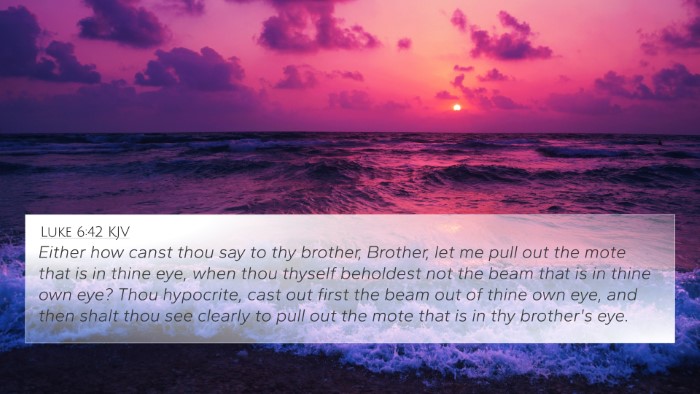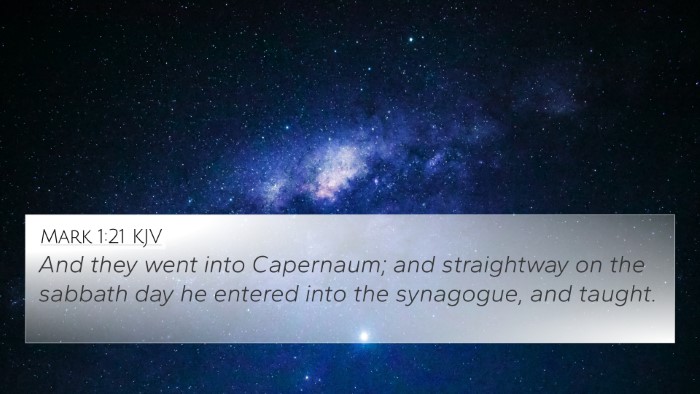Bible Verse Meaning: Luke 4:23
Luke 4:23 states: "And he said unto them, Ye will surely say unto me this proverb, Physician, heal thyself: whatsoever we have heard done in Capernaum, do also here in thy country." This verse speaks to the unfolding tension between Jesus and the people of Nazareth, His hometown.
Contextual Background
In the context of Luke, this moment occurs following Jesus’ early ministry where He has performed miracles and preached in Capernaum. Upon returning to Nazareth, the reactions of the locals reflect a mixture of skepticism and curiosity.
Insights from Commentaries
This section synthesizes insights from Matthew Henry, Albert Barnes, and Adam Clarke. Each commentary provides valuable interpretations that contribute to our understanding of this verse.
-
Matthew Henry:
Henry emphasizes the irony embedded in the phrase "Physician, heal thyself." This proverb indicates the expectation the people had of Jesus performing miracles for them, just as they had heard He did elsewhere. Henry points out the deeper spiritual meaning; they sought physical proof rather than recognizing the spiritual truths presented by Jesus.
-
Albert Barnes:
Barnes notes that the people's demand for miracles in Nazareth stems from their familiarity with Jesus as a local figure. He highlights the importance of faith, suggesting that extraordinary signs should not be the basis for belief. This reflects a broader theme in Jesus' ministry of the necessity of faith over sign-seeking.
-
Adam Clarke:
Clarke provides a cultural and historical perspective, explaining how the proverb reflects the common expectations of those who witnessed miracles. Clarke points out the difficulty in accepting Jesus as a prophet when they had known Him as a child, demonstrating the challenge of preconceptions when encountering divine authority.
Bible Verse Cross-References
This verse connects with various themes and scenarios across the scriptures. Below are key Bible verses that enhance the understanding of Luke 4:23:
- Matthew 13:57: "And they were offended in him. But Jesus said unto them, A prophet is not without honour, save in his own country, and in his own house."
- Mark 6:4: "But Jesus said unto them, A prophet is not without honour, but in his own country, and among his own kin, and in his own house."
- John 1:46: "And Nathanael said unto him, Can there any good thing come out of Nazareth? Philip saith unto him, Come and see."
- Luke 4:24: "And he said, Verily I say unto you, No prophet is accepted in his own country."
- Luke 5:31: "And Jesus answering said unto them, They that are whole need not a physician; but they that are sick."
- Isaiah 61:1: "The Spirit of the Lord God is upon me; because the Lord hath anointed me to preach good tidings unto the meek; he hath sent me to bind up the brokenhearted, to proclaim liberty to the captives, and the opening of the prison to them that are bound."
- Matthew 4:24: "And his fame went throughout all Syria: and they brought unto him all sick people that were taken with divers diseases and torments, and those which were possessed with devils, and those which were lunatick, and those that had the palsy; and he healed them."
- Hebrews 11:6: "But without faith it is impossible to please him: for he that cometh to God must believe that he is, and that he is a rewarder of them that diligently seek him."
- John 4:44: "For Jesus himself testified, that a prophet hath no honour in his own country."
- Luke 8:43-48: A demonstration of faith is portrayed through the healing of the woman with the issue of blood, contrasting societal rejection with personal faith.
Thematic Bible Verse Connections
In analyzing Luke 4:23, we see that it connects broadly with themes of rejection, honor, and the demand for evidence in faith. The interactions among Jesus, his contemporaries, and the surrounding culture reflect a microcosm of theological debates that continue throughout scripture.
Bridging Verses
Understanding the connections between this verse and others deepens our engagement with the text. For instance, considering how Hebrews 11:6 emphasizes the necessity of faith aligns with the skepticism faced by Jesus. Similarly, Matthew 4:24 juxtaposes Jesus’ accepted miracles in Capernaum with the rejection He experiences in Nazareth.
Conclusion
The verse Luke 4:23 serves as a poignant reminder of the struggles of faith and acceptance. By utilizing tools for Bible cross-referencing, we can appreciate the richness of scripture as a web of interconnected narratives and teachings that illuminate our understanding of Jesus’ ministry.
Final Reflections
For anyone studying scripture, developing an awareness of cross-referencing biblical texts can enhance interpretations. Resources such as Bible concordances or Bible reference guides help readers delve into inter-Biblical dialogue and draw thematic parallels that enrich their spiritual journey.


















